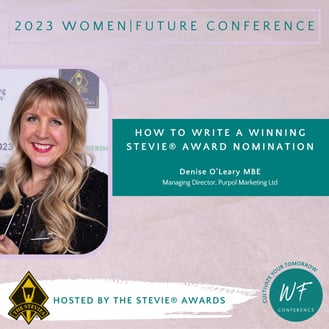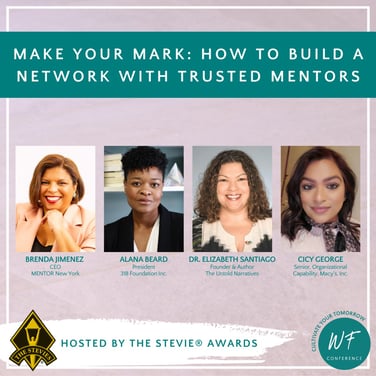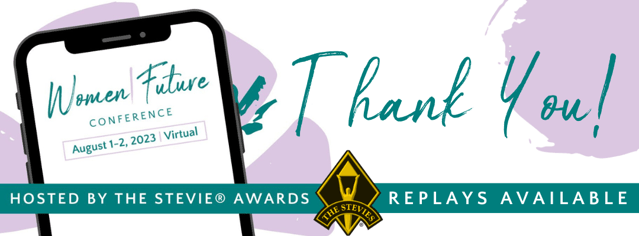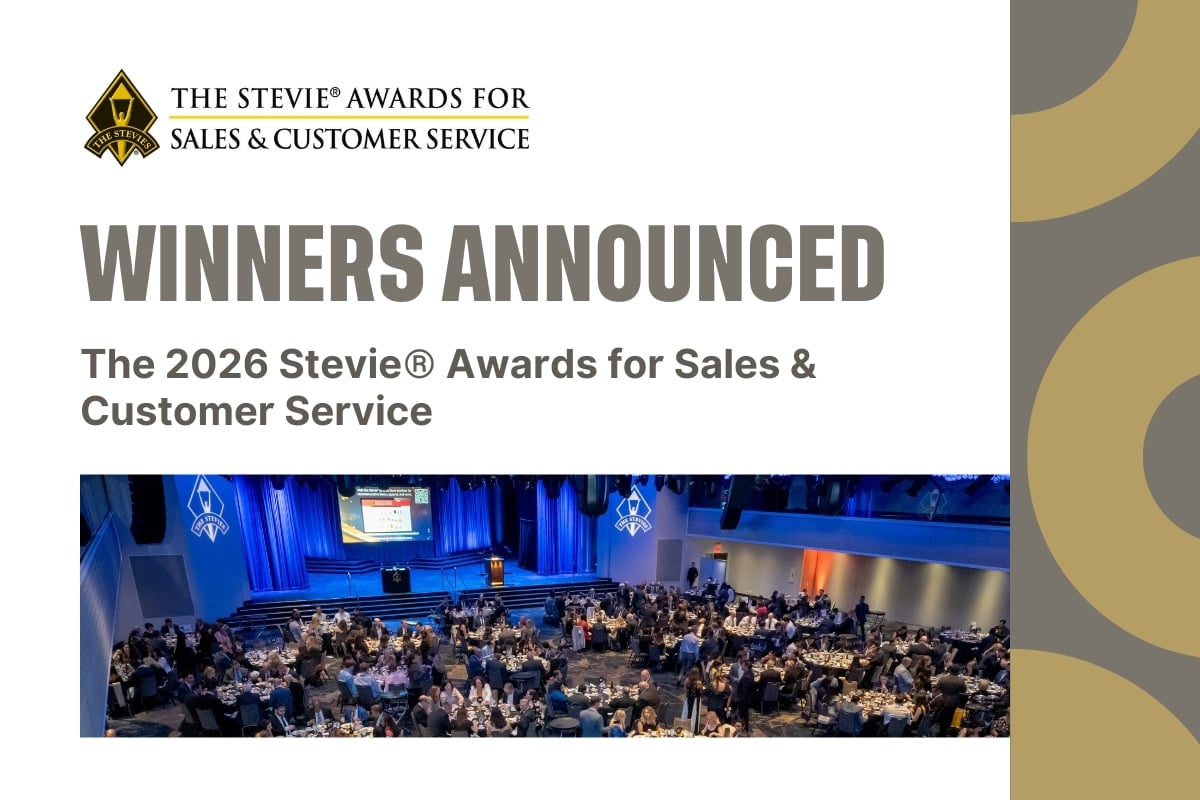-3-1.jpg?width=315&height=177&name=2023%20WFC%20Media%20Kit%20(1080%20%C3%97%201920%20px)-3-1.jpg) The sixth annual Women|Future Conference, held virtually from August 1-2, brought together over 650 ambitious, forward-thinking women across industries and career stages to connect and discuss key issues that impact their industries, careers, and lives.
The sixth annual Women|Future Conference, held virtually from August 1-2, brought together over 650 ambitious, forward-thinking women across industries and career stages to connect and discuss key issues that impact their industries, careers, and lives.
A professional development, learning, and networking event, the Women|Future Conference brings together a community of women small business owners, executives, entrepreneurs, and professionals interested in starting a business. Attendees tuned in from cities across the United States, Canada, Australia, Asia, and Europe.
The 2023 conference agenda featured two days of panels, workshops, and breakout sessions hosted by over 30 world-class speakers, including CEOs, founders, entrepreneurs, thought leaders, and small business consultants from The Audacious Agency, MENTOR New York, Jennings Social Media & MarTech, and others.
Speakers also included seasoned leaders from global organizations like Microsoft's Corporate Vice President - Global Industry Marketing; SAP's Chief Marketing & Solutions Officer; and the Founder and CEO of Fempire, the #1 global coaching brand for women business owners.
Top Attended Sessions From #WomenFuture23
Throughout the two-day conference, attendees participated in sessions about business networking, work-life balance, wealth attraction, overcoming adversity, mentorship, and more. Below are the top conference sessions attended:
- Turning Passion Into Profit as an Entrepreneur
- From Wages to Wealth: Making the Shift from Employee to Entrepreneur
- Taking the Leap: How to Transfer Your Skills from One Role to the Next
- Should I Enter the Stevie Awards? Learn How Leaders Leverage Awards to Boost their Business and build Credibility
On Day 1 of #WomenFuture 23 in the session “Funding Female Futures: Navigating the Investment Landscape and Bootstrapping Success” two female entrepreneur and funding experts, Marnie LeFevre, Founder & CEO of Fempire, and Mez Gallifuoco, Founder & CEO of The Mad Ones, delved into the realities of the investment landscape for women and shared valuable insights on identifying the right investors and business opportunities. 
With her international coaching brand Fempire, Marnie has made it her mission to inspire women to step up and lead with courage, confidence, and from the feminine. Mez is an award-winning technology entrepreneur and strategist for some of the world’s most innovative companies including QBE, AMEX, Virgin Australia, and several startups in Sydney and New York.
Early in the discussion, Mez relayed that men in business are often asked, “What will you do with success?” while women are more likely to be asked, “How will you overcome all these challenges?” Women are sometimes viewed as already disadvantaged in the business space, in some sectors more than others. Even if you have a brilliant idea and are fully committed to making it work, it can be quite intimidating when it comes to getting your vision off the ground, she said, especially when it comes to learning about and gaining funding, and then growing it.
Before trying to go directly to investors and trying to push a business plan at them, both Mez and Marnie recommend aiming for casual and helpful conversations with investors first. Instead of calling to abruptly ask someone to review your data and plan, just ask them for coffee. Have a conversation about what you’re trying to achieve, what insights they may have, and try to create a connection.
“Start asking questions—gain advice. Use them as a mentor, and even if they're not prepared to invest in your business, at least you can gain a whole lot of insight. It's about building a relationship before sticking out your hand,” noted Mez.
She emphasized that who the founders are and who your team members are (and how adept or skilled they are) is even more important than your business plan or statistics. When it comes to finally making the pitch for funding, Mez related her own challenges of walking into very intense and critical business meetings. “They barely look at the idea, to be honest. They only really look at, what is the team? do they know what they’re doing….and we’re interested in the founder.”
Both Mez and Marne agreed that having a well-connected founder—or, even better, multiple founders—who have similar business values can go a long way in securing the relationship and funding. Marne commented: “We're looking for whether we can get along with you, whether we believe in you, whether we think you've got what it takes, whether you have the grit that it takes.”
Day 2 of the conference opened with an instructional session on “How to Write a Winning Stevie Award Nomination” given by Denise O’Leary, MBE. Denise is a 21-time Stevie Award winner and relayed her extensive experience on how she has repeatedly created winning Stevie Award entries. Her company, Purpol Marketing, specializes in marketing strategy development and bid management for public sector contracts across various industries.
Denise answered many common questions she gets from clients across industries on finding and applying for awards, including:
- Why should you enter awards?
- Where do you find awards to enter?
- How to find the right awards for your business
- What data do you need to consider?
Denise explained that, based on your specific industry or field, you should build an award target list and track when your targeted awards are open for nominations and what they will require. For example, even the Stevie Awards has eight distinct programs, and, depending on your field, one or a variety of them will get you a different level of exposure to a specific audience, geographic region, or market. Note the deadlines you need to hit and the networking or marketing opportunities they offer. 
She detailed the full Stevie application journey and even provided hints on what judges really want to see. “Play to your individual strengths in your nomination,” she emphasized. “How do you offer better value? How can you explain what you’re doing and make your strengths clear? Prove what you do with tangible evidence.” She covered how to examine your own organization and objectives and then how to tell your personal and business story as well as what types of data should be included with your entry.
Regarding gathering evidence before writing your Stevie Awards nomination, Denise said, “It’s really important to gather evidence about your business success before writing your nomination.
- Read all instructions to make sure you’re eligible.” She also advised doing the following:
- If you’re doing a video, review their specific rules on formatting, length, language, etc.
- Include key performance indicators (KPIs) or other materials in the supporting materials section of the entry submission, like customer testimonials, photos, case studies, etc.
- Include a folder of press coverage to share, if available.
“Think about what the judges would like to see. Think about their process,” she noted. “If you need to proofread your nomination more than once a day to make sure it’s perfect, you should. Explain in simple terms what your business does so it’s clear to any judge why you should win a Stevie Award.”
She said you will want to keep track of progress, store, and revisit old nominations you’ve written. In addition, after entering Stevie Awards competitions, all entrants can access the judge’s comments. This feedback can serve as an invaluable asset for guidance on areas the judges were impressed with and how entry nominations can be improved in the future.
In an educational panel discussion, "Make Your Mark: How to Build a Network with Trusted Mentors" that took place on Day 2, speakers explored how to build social capital and a network you can count on.
Brenda Jimenez, CEO of MENTOR New York, led this panel, and other speakers included Alana Beard, four-time WNBA Champion and President of the 318 Foundation and Founder of Transition Play; Dr. Elizabeth Santiago, author, educator, designer, and leader; and Cicy George, Senior, Organizational Capability at Macy’s. These panelists have made their marks in different industries with an interesting story of how they’ve each become supporters of each other in ways that led to career successes.
Panelists initiated the conversation by examining the concept of social capital—the connections built and nurtured over time that may have beneficial professional implications—and how women specifically can work toward building this capital. For women especially, they agreed, it can be hard simply to ask for help and be vulnerable with a mentor.
Alana commented: "I encourage [those she mentors] to be to be as vulnerable as possible in these moments because there's no way for people to really understand who you are and what you're going through and what your desires are if you don't speak about them.”
Elizabeth added another perspective, noting that getting comfortable relaying your needs and challenges not only helps you find the help and support you need but also enables you to validate and encourage others with your own experiences once you come out on the other side:
“For me, this is where storytelling comes in. As I look back at my life and my career and all the things that have happened and led me to where I am….there are so many people involved, so many stories, so many ways that I've asked for help over the years that I often share those experiences or share an anecdote about something and usually that helps someone else.”
They explained that self-reflection and conscious awareness of your strengths and, even more so, your weaknesses will help to solidify a sense of confidence and self-worth. The sooner you do the inner work and get past the common feeling of imposter syndrome, the faster you and others will see your potential. In a perfect example of how to be authentic and vulnerable with your peers, Cicy shared part of her personal journey with self-worth and acceptance:
“I've only recently gotten more comfortable with feeling like I am enough, and I feel like I have a hidden greatness that I have yet to unleash. That's just a realization I feel I've come into just now in my early 40s. It's taken me a long time to get here — even just to admit in a global forum that I'm in my early 40s—and I'm just learning some of these lessons now that I wish I had learned earlier on in my life and my career.”
Special Thanks to Our 2023 Sponsors and Partners
We are proud to partner with publications, media outlets, and organizations that share our mission of supporting women in business:
- Enterprising Women Magazine
- ImageShield
- Investably LLC
- MBE Magazine
- Professional Woman’s Magazine
- Trust Relations
If you are interested in sponsorship opportunities for the 2024 Women|Future Conference, sign up here to get notified of the 2023 prospectus release.













